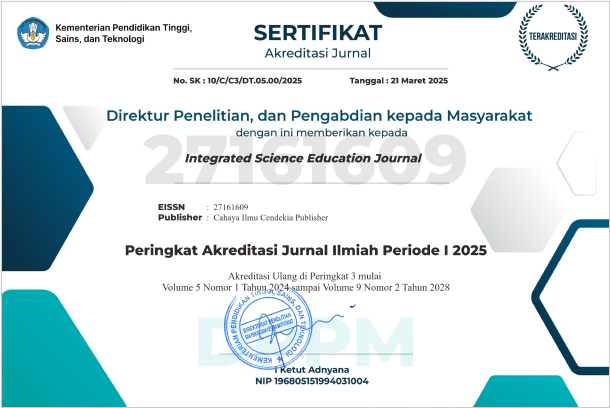Cooperative Learning Model on Atomic Structure Material and It’s Influence on the Scientific Attitude of Class X Students at Senior High School
Abstract
Purpose of the study: This study aims to analyze the implementation of the Think Pair Share cooperative learning model on atomic structure material and its effect on students' scientific attitudes of class X students at Senior High School 1.
Methodology: This study included a quasi-experiment. The sample is determined by a simple random sampling technique. The research instrument was in the form of an observation sheet. The data were analyzed to see the effect of the implementation of the TPS model on students' scientific attitudes using a linear regression test and a significance test with a t-test.
Main findings: The implementation of the PjBL model is categorized as good, in terms of teachers and students, with an average of 81.25% and 74.78 %, respectively. Students' scientific attitude is categorized as good, with an average of 73.97% for three meetings. The correlation test results between students' implementation of the TPS model and students' scientific attitudes were obtained r = 0.707. The results of the study proved that the implementation of the TPS-type cooperative learning model went well, and there was an influence between the implementation of the TPS-type cooperative learning model and the students' scientific attitude on atomic structure material for class X at Senior High School 1.
Novelty/Originality of this study: The update in research is to complement previous research by proving that the TPS-type cooperative learning model affects students' scientific attitudes. Students' scientific attitude is essential to be developed in the current era of globalization.
References
B. C. Putri., F. T. Aldila, and M. M. Matondang, "The Relationship Between Independent Learning Characters and Student Learning Outcomes," Integr. sci. educ. J. , vol. 3, no. 2, pp. 45–49, 2022, doi: 10.37251/isej.v3i2.252.
D. Darmaji., A. Astalini., D. A. Kurniawan., and F. T. Aldila, “Students' Perceptions in the Use of Web-Based Character Assessment: A View from Gender Perspective,” J. Educators. Progressive , vol. 11, no. 2, pp. 362–383, 2021, doi: 10.23960/jpp.v.
A. Sanova., A. Bakar., A. Afrida., D. A. Kurniawan., and F. T. Aldila, “Digital Literacy on the Use of E-Module Towards Students' Self-Directed Learning on Learning Process and Outcomes Evaluation Courses,” JPI ( Journal of Education, Indonesia , vol. 11, no. 1, pp. 154–164, 2022, doi: 10.23887/jpi-undiksha.v11i1.36509.
F. T. Aldila., M. M. Matondang, and L. Wicaksono, "Identification of Student Learning Interest in Physics Subject at SMAN 1 Muaro Jambi," J. Sci. educ. Pract. , vol. 4, no. 2, pp. 22–31, 2020.
E. F. S. Rini., R. Fitriani., W. A. Putri., A. A. B. Ginting, and M. M. Matondang, "Analysis of Hard Work in Physics Subjects at SMAN 1 Jambi City," SAP (Artik. Education Arrangement), vol. 5, no. 3, pp. 221–226, 2021, doi: http://dx.doi.org/10.30998/sap.v5i3.7764.
F. T. Aldila., D. Darmaji., and D. A. Kurniawan, "Analysis of User Responses to the Application of Web-based Assessments on Assessing Students' Attitudes towards Science Subjects and Values of Character Education," Edukatif J. Educator Science. , vol. 4, no. 1, pp. 1253–1262, 2022, doi: https://doi.org/10.31004/edukatif.v4i1.2091.
Y. I. Suhara., N. D. Kiska., and F. T. Aldila, "The Relationship between the Character of Enjoying Reading and the Thematic Learning Outcomes of Elementary School Students," Integr. sci. educ. J. , vol. 3, no. 1, pp. 11–15, 2022, doi: 10.37251/isej.v3i1.182.
M. Iqbal., A. A. B. Ginting., F. T. Aldila., W. A. Putri., S. Maryani, and T. Ratnawati, "The Relationship between Student Perceptions in the Use of Web-Based Assessment with Student Character at SMPN 2 Batanghari," J. Educator. Edutama, vol. 9, no. 1, pp. 51–60, 2022.
S. Nurjanah, "Assessment Objects in the Perspective of the 2013 Curriculum," J. Educators. and School Teacher Teaching. … , vols. 4, no. 2, pp. 85–91, 2021
B. Betwan, "The Importance of Affective Evaluation in PAI Learning in Schools," Al-Fikri J. Stud. and Researcher. Educator. Islam , vol. 2, no. 1, pp. 45–60, 2019, doi: 10.30659/jspi.v2i1.4015.
H. Hafsah., F. Umar., and S. Ibsik, "Evaluation Design for the Affective Domain in PPKN Subjects at SMP Negeri 8 Makassar," Phinisi Integr. Rev. , vol. 4, no. 4, pp. 484–495, 2021.
M. Wulandari., R. P Wirayuda., F. Aldila, and R. Wulandari, “Description of students' Integrated Science Process Skills on Friction Material on a Flat Field,” Lens J. Physical Education. , vol. 8, no. 2, pp. 93–103, 2020, doi: 10.33394/j-lkf.v8i2.3206.
W. A Putri., R. Fitrini., E. F. S. Rini., F. T Aldila, and T. Ratnawati, "The Influence of Motivation on Learning Outcomes of Science Students at SMAN 6 Muaro Jambi," SAP (Artik. Education Arrangement) , vol. 5, no. 3, 2021.
F. T. Aldila., R. P. W. Yuda., M. Wulandari., and A. P Ningsi, "Description of Science Process Skills of SMAN 10 Muaro Jambi on Material Equilibrium on Ropes," J. Educator. Fis. , vol. 9, no. 2, pp. 112–19, 2020.
E. F. S. Rini., D. Darmaji, and D. A. Kurniawan, "Identification of Practicum Activities in Improving Science Process Skills at SMPNs throughout the Bajubang District," Edukatif J. Educator Science. , vol. 4, no. 2, pp. 2476–2481, 2022, doi: 10.31004/edukatif.v4i2.2360.
D. Darmaji., D. A. Kurniawan., A. Astalini, and E. F. S. Rini, "Science Processing Skill and Critical Thinking: Reviewed Based on the Gender," JPI (Journal of Education. Indones. , vol. 11, no. 1, pp. 133–141, 2022, doi: 10.23887/jpi-undiksha.v11i1.35116.
S. W. Ulfa, "Traditioning a Scientific Attitude in Learning Biology," J. Biolokus J. , vol. 1, no. 1, pp. 1–10, 2018.
D. Darmaji., A. Astalini., D. A. Kurniawan, and F. T. Aldila, “Gender and Perception: Implementation of Web-based Character Assessment in Science Learning,” Int. J.Instr. , vol. 15, no. 4, pp. 311–338, 2022, doi: 10.23887/jere.v6i1.37737.
N. Sappaile, "Relationship of Comparative Conceptual Understanding with Stoichiometry Material Learning Outcomes," JIP STKIP Kusuma Negara Jakarta , vol. 10, no. 2, pp. 58–71, 2019.
T. Djonomiarjo, "The Influence of Problem Based Learning Models on Learning Outcomes," Script J. Educator Science. Nonform. , vol. 5, no. 1, pp. 39–46, 2020, doi: 10.37905/aksara.5.1.39-46.2019.
A. M Abidin, "Teacher Creativity Using Learning Models in Improving Student Learning Outcomes," Didakt. J. Education , vol. 11, no. 2, pp. 225–238, 2017, doi: 10.30863/didaktika.v11i2.168.
C. H. Prasetyo, "Improving Mathematics Learning Outcomes about Multiplication and Division of Integers through Cooperative Learning Type Student Team Achievement Divisions (STAD) in Class V SDN 1 Stagen Kotabaru Regency," Scholar J. Ilm. Educator. , vol. 10, no. 1, pp. 11–19, 2022, doi: 10.33659/cip.v10i1.214.
A. Solihah, "The Influence of Learning Models on Mathematics Learning Outcomes in View of Student Learning Independence," Cakrawala Pedagogue. , vol. 4, no. 1, pp. 11–18, 2020, doi: 10.51499/cp.v4i1.127.
F. Sya'adzah., P. Trapsilo., and R. W. Bachtiar, "Implementation of a Scientific Attitude through the TPS Type Cooperative Model accompanied by Practicum Methods in Learning Physics," Semin. Nas. Educator. Fis. 2017 Univ. Jember , vol. 2, no. september, pp. 1–5, 2017.
N. Putu., M. Cahyani., N. Dantes., and N. W. Rati, "Effectiveness of the TPS Type Cooperative Learning Model on Social Studies Learning Outcomes," J. Researcher. and Developer. Educator. , vol. 4, no. 3, pp. 362–370, 2020, doi: 10.23887/jppp.v4i3.27410.
K. Kasimuddin, "The Use of the TPS (Think Pair Share) Cooperative Learning Model to Increase the Activities and Results of Physics Learning for Class XI IPA 2 Students of SMAN 9 Makassar," J. Educator. Fis. Univ. Muhammadiyah Makasar , vol. 4, no. 1, pp. 88–105, 2016.
S. Sugiyono, Educational Research Methods . Bandung: Alfabeta, 2002.
A. Aunurrahman, Learning and Learning . Bandung: Alphabet, 2009.
D. Daryanto, Scientific Learning Approach . Yogyakarta: Gava Media, 2014.
A. Ani, Increasing Curiosity and Learning Achievement on Sample Material of Legislation through the Think, Pair, Share Type Cooperative Learning Model in Class V SD Negeri 1 Karangturi . 2009.
F. Isdianti, "Student's Social Skills in Electrolyte and Non-Electrolyte Solutions at State Senior High School 1 Surabaya in the Application of Think-Pair-Share (TPS) Cooperative Learning Models," vol. 2, no. 1, pp. 19–26 , 2012.
K. Kholilah., A. Ramadhanti., R. Fitriani., E. Febri., and M. R Pratiwi, "The Relationship between Hard Work and Physics Learning Outcomes at SMA Negeri 1 Jambi City," J. Sci. educ. Pract. , vol. 4, no. 1, pp. 41–48, 2020.
F. Yolviansyah., Suryanti., E. F S. Rini., S. Wahyuni., and M. M Matondang, "The Relationship between Student Learning Interest and Physics Learning Outcomes at SMAN 3 Muaro Jambi," Appointed Teaching J. Researcher. Educator Science. , vol. 4, no. 1, pp. 16–25, 2021.
D. Darmaji., A. Astalini., D. A. Kurniawan., and E. F. S. Rini, "Gender analysis in measurement materials: Critical thinking abilities and science processing skills," J. Ilm. Educator. Fis. Al-BiRuNi , vol. 11, no. 1, pp. 113–128, 2022, doi: 10.24042/jipf.
M. M. Matondang., E. F. S. Rini, N. D. Putri, and F. Yolviansyah, "Comparative Test of Student Motivation in Class XI MIPA 2 and XII MIPA 2 at SMA Negeri 1 Muaro Jambi," J. Science and Educators. Fis. , vol. 16, no. 3, p. 218, 2020, doi: 10.35580/jspf.v16i3.15553.
Copyright (c) 2023 Fitria Mardiana Mardiana, Netti Yulia Ningsih

This work is licensed under a Creative Commons Attribution-NonCommercial 4.0 International License.
Authors who publish with this journal agree to the following terms:
- Authors retain copyright and acknowledge that the Integrated Science Education Journal is the first publisher licensed under a Creative Commons Attribution 4.0 International License.
- Authors are able to enter into separate, additional contractual arrangements for the non-exclusive distribution of the journal's published version of the work (e.g., post it to an institutional repository or publish it in a book), with an acknowledgment of its initial publication in this journal.
- Authors are permitted and encouraged to post their work online (e.g., in institutional repositories or on their website) prior to and during the submission process, as it can lead to productive exchanges and earlier and greater citation of published work.







.png)
.png)






